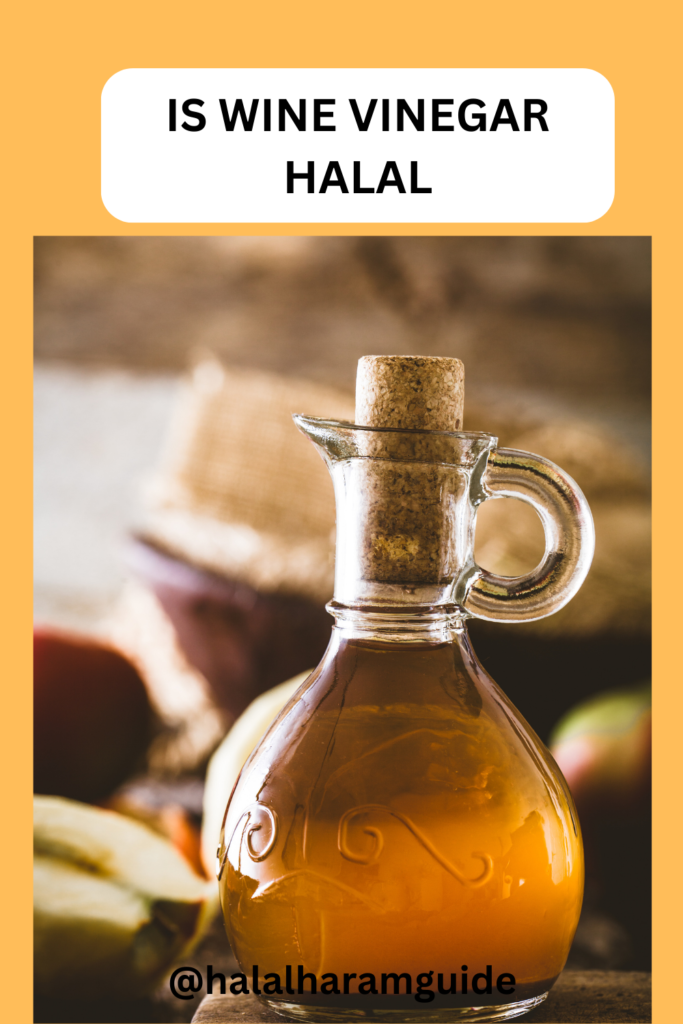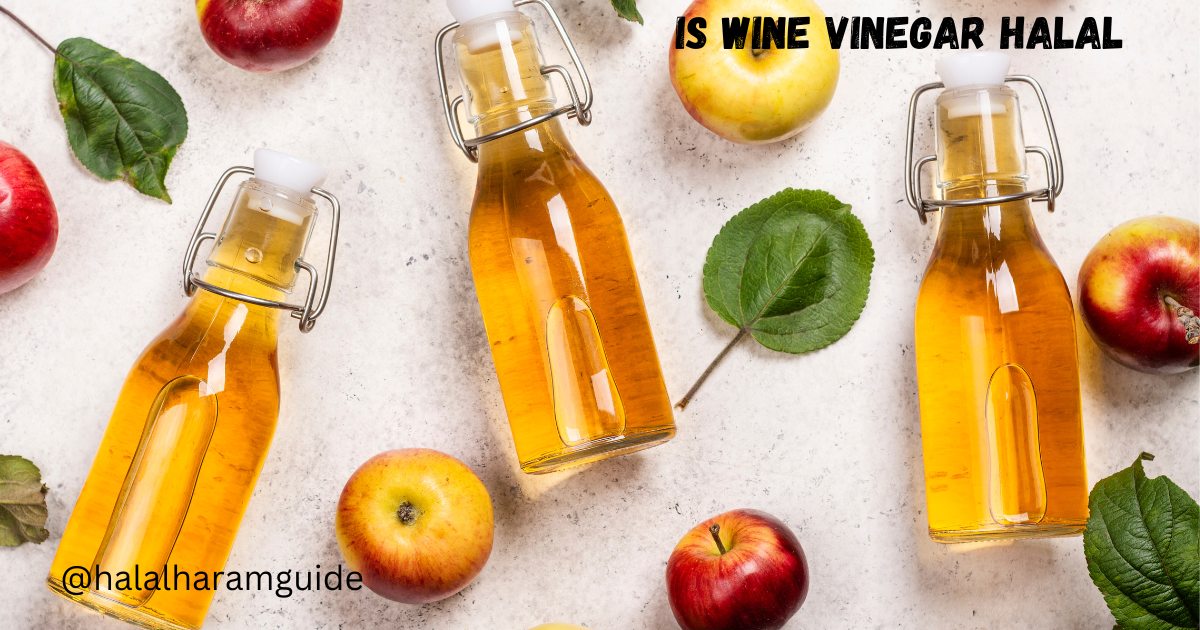Welcome to our blog post addressing a common question: Is wine vinegar halal?
In this discussion, we aim to provide you with clear and straightforward insights into the halal status of wine vinegar and its compatibility with Islamic dietary guidelines.
For those seeking to adhere to halal principles in their food choices, understanding the intricacies of wine vinegar is essential.
Join us as we explore the topic and shed light on whether wine vinegar aligns with halal dietary practices in simple terms.
What is wine Vinegar?
Wine vinegar is a type of vinegar that is made through the fermentation of wine. It begins with the conversion of alcohol into acetic acid by acetic acid bacteria.
This process imparts a tangy and acidic flavor to the vinegar. Wine vinegar can be made from various types of wine, including red and white wines.
The flavor and characteristics of the vinegar can vary depending on the type of wine used in its production.
Is Wine Vinegar Halal Or Haram
The permissibility of wine vinegar (or any type of vinegar) in Islam is generally considered halal.
This is because the transformation of wine into vinegar involves a complete chemical change, where the alcohol content is converted into acetic acid through the process of fermentation. As a result, the final product, vinegar, no longer contains alcohol.
Islamic scholars widely agree that vinegar, regardless of its origin as wine or any other alcoholic beverage, is halal and permissible for Muslims to consume.
However, it’s essential to ensure that the vinegar does not contain any added ingredients or flavors that are haram (forbidden) in Islam.
What Is The Halal Or Haram Recipe Of Wine Vinegar?
The halal or haram status of a recipe involving wine vinegar depends on the overall ingredients and preparation methods used.
Wine vinegar itself is generally considered halal in Islam because it undergoes a transformation during the fermentation process, converting the alcohol into acetic acid, which is permissible for Muslims to consume.
However, to ensure a recipe is halal, it’s essential to avoid using wine or any other alcoholic ingredients in the dish.
Additionally, check the ingredient label of the wine vinegar to confirm that it does not contain any prohibited substances or additives.
When cooking with wine vinegar, any residual alcohol content typically evaporates during the cooking process, leaving behind the vinegar’s flavor and acidity. Always exercise caution, and verify the purity of ingredients to align with halal dietary guidelines.
Hadiths Explaining Wine Vinegar As Halal Along With Other Schools of Thought.
In Islamic jurisprudence, the permissibility of wine vinegar (or any type of vinegar) is widely accepted, and there are Hadiths (sayings and actions of the Prophet Muhammad, peace be upon him) that support this view. Here are a few Hadiths that explain the halal status of vinegar:
Hadith from Sahih al-Bukhari:
Narrated by Aisha (may Allah be pleased with her): “The Prophet (peace be upon him) used to eat vinegar and he used to like it.” (Sahih al-Bukhari)
Hadith from Sahih Muslim:
Narrated by Ibn ‘Abbas (may Allah be pleased with him): “There is no (Haram) substance which Allah has created, except that He created its antidote.” (Sahih Muslim)
Conclusion
In conclusion, wine vinegar is generally considered halal in Islam due to the fermentation process that transforms the alcohol content into acetic acid, making it permissible for Muslim consumption.
This view is supported by Hadiths and is widely accepted across different Islamic schools of thought. However, when using wine vinegar in recipes, it’s crucial to ensure that the overall dish adheres to halal dietary guidelines, with no inclusion of prohibited ingredients or alcoholic substances.
As always, individuals should exercise caution and verify the purity of the vinegar by checking the ingredient label to maintain compliance with their religious dietary preferences and beliefs.
Frequently Asked Questions
Q1. Can Muslims Cook With Red Wine Vinegar?
Muslims can use red wine vinegar in their cooking, but certain conditions must be met to ensure it complies with halal dietary guidelines. The key consideration is to confirm that the red wine vinegar used does not contain any residual alcohol.
However, it’s crucial to check the ingredient label on the red wine vinegar bottle to confirm its purity and verify that it does not contain added alcoholic ingredients or prohibited substances.
For those with concerns, alternative types of vinegar like apple cider vinegar or white vinegar can be used as substitutes to avoid any potential association with alcohol.
Q2. Can Muslims Drink Vinegar?
Muslims can consume vinegar as it is generally considered halal (permissible) in Islamic dietary guidelines. Vinegar is produced through the fermentation process, during which alcohol content is completely transformed into acetic acid. Since alcohol is prohibited (haram) in Islam, the conversion of alcohol into a different substance makes vinegar permissible for Muslims to consume.
Vinegar is commonly used in cooking, food preparation, and as a condiment. It is also used in various salad dressings, marinades, and sauces. Muslims can use vinegar in these culinary applications and enjoy its flavor and acidity.
However, it’s important to ensure that the vinegar used is pure and does not contain any added alcoholic ingredients or prohibited substances. Always check the ingredient label on the vinegar bottle to confirm its purity and adherence to halal dietary guidelines.
Q3. Do Muslims use Red Wine Vinegar in Meal?
Muslims who adhere to halal dietary guidelines can use red wine vinegar in their meals, provided the vinegar meets specific criteria.
It should not contain any significant alcohol content, and its ingredient label should confirm its purity with no added alcoholic ingredients or prohibited substances.
When used in cooking, any residual alcohol content typically evaporates, leaving behind the vinegar’s flavor and acidity. However, some Muslims may choose alternative vinegars to avoid any association with alcohol. The decision to use red wine vinegar in meals depends on individual preferences and the level of adherence to halal dietary principles.
- “Is Lobster Halal? Understanding Its Permissibility”
- “Is Drawing Haram in Islam? Understanding the Perspective”
- “Is Fermented Kimchi Halal? Exploring Kimchi’s Halal Status”
- “Is Collagen Halal? Unveiling the Halal Status of Collagen”
- “Is Wine Vinegar Halal? Unveiling Its Permissibility”


